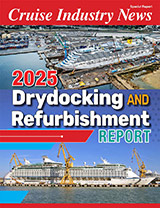Containerized cargo volumes continued to grow at Port Everglades during Fiscal Year 2008 (October 1, 2007 through September 30, 2008) as the South Florida seaport experienced an 8.66 percent increase in tonnage and a 3.83 percent increase in TEUs (20-foot equivalent units, the standard used to measure containers).
Port Everglades’ total operating revenue, which includes revenue from waterborne commerce, real estate leases, parking and other Port services, increased 4.4 percent to $117,441,065 in FY2008, while expenses rose by less than 1.4 percent to $73,093,351, according to unaudited fiscal year-end reports. The operating revenue includes a one-time $3.8 million payment from APM/Universal Terminal for early termination of the company’s agreement and lease. While Net Operating Income remained steady at $14 million, the Port realized a $27.3 million increase in Net Assets when grants and customer direct investments are included.
Overall waterborne commerce, however, decreased by 8.2 percent to 24.2 million tons due to lower volumes of petroleum products and construction materials.
Port Director Phillip C. Allen attributed the growth in containerized cargo to increased business at several of the Port’s existing terminal operators including Crowley Liner Services, Florida International Terminal, Florida Transportation Services, Port Everglades Terminals Ltd., Sun Terminals and St. John Shipping.
“Containerized cargo was a positive note in a tough economic year. While there have been indications that shipping markets have softened in the last two months, we are cautiously optimistic that the volumes will stabilize and continue an upward trend. Just like all businesses that depend upon international trade, we are monitoring world events and hope for an economic upswing,” Allen says. “However, we also recognize that we must move forward with necessary infrastructure improvements so that Port Everglades is ready and able to accommodate our customers as they grow their businesses.”
Containerized cargo, at 6.58 million tons and 985,095 TEUs, has been on a steady upswing at Port Everglades, almost doubling since FY2002. Port officials attribute this 92 percent growth to new terminal operators such as Port Everglades Terminal Ltd. (MSC) and Florida International Terminal, in the Port’s Southport area, who are bringing more international trade through oceangoing shipping to Broward County.
“The first step in our marketing efforts was to attract quality marine terminal operators to Port Everglades. Now, our focus is to assist these operators and our long-time customers to expand their services and bring more shipping business to the area,” says Port Everglades Business Development Director Carlos Buqueras.
Rolling and floating cargos such as yachts, trucks, tractors and automobiles also increased by 22.5 percent to 240,129 tons in FY2008. More used vehicles are being transported to the islands in the Caribbean, which spurred this growth.
Multi-day cruise traffic remained steady in FY2008, while the number of daily cruise passengers declined by 18 percent, which Port officials attributed primarily to competitive gaming from landside venues and the departure of SeaEscape’s Island Adventure twice daily cruises from the Port. Currently, Port Everglades is the world’s third busiest cruise homeport behind the Port of Miami and Port Canaveral. However, by 2011 Port Everglades is expected to become the No. 1 cruise port in the world with the addition of year-round sailings by Royal Caribbean International’s (RCI) Oasis-class ships in late 2009 and 2010. At 220,000 gross-registered-tons, RCI’s Oasis ships will be the world’s largest cruise ships at 5,400 passengers each.
Bulk and break bulk cargos such as cement, steel and lumber decreased by 52 percent from FY2007, which Port officials attribute to the downturn in the South Florida construction industry, including the related downturn in the South Florida housing market.
As one of South Florida’s leading economic powerhouses, Port Everglades is the gateway for international trade and cruise vacations. Port Everglades is one of the busiest cruise ports worldwide. It is among the fastest growing container ports in the United States, according to the PIERS import/export database. And, Port Everglades is South Florida’s main seaport for receiving petroleum products including gasoline and jet fuel. The Port Everglades Department is a self-supporting Enterprise Fund of Broward County government with operating revenues of approximately $117 million. Approximately $625 million annually in state and local taxes are associated with Port Everglades, and the Port’s activity generates its economic impacts without the support of any local tax dollars for operations. The total value of economic activity at Port Everglades surpasses $18 billion. Approximately 200,000 Florida jobs are impacted by the Port, including 11,620 people who work for companies that provide direct services to Port Everglades.



